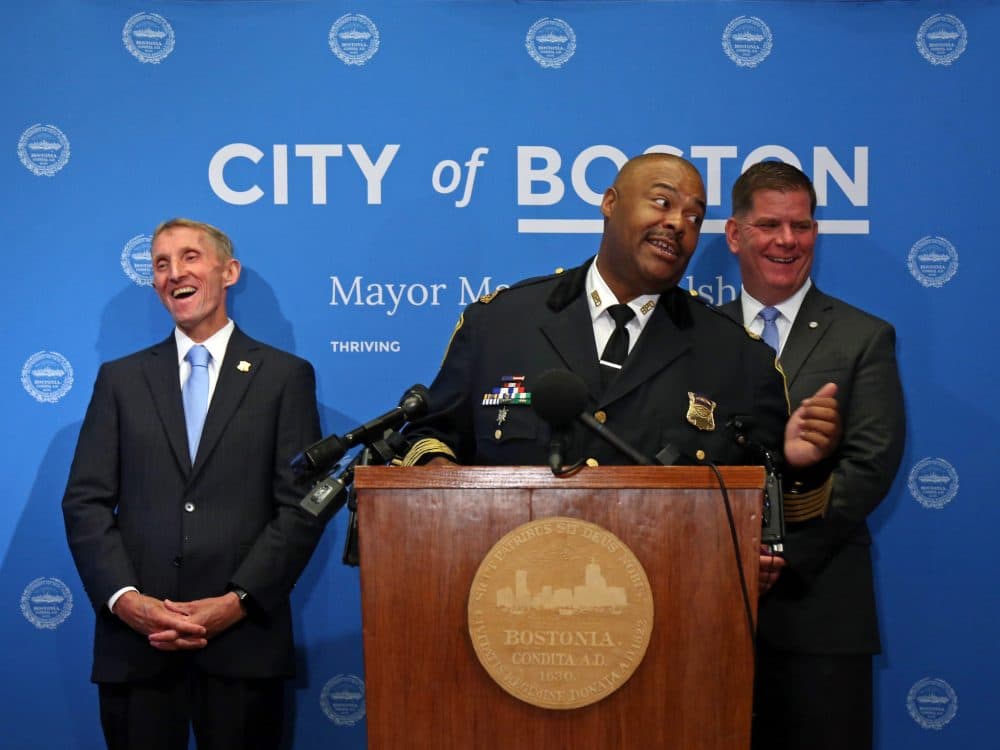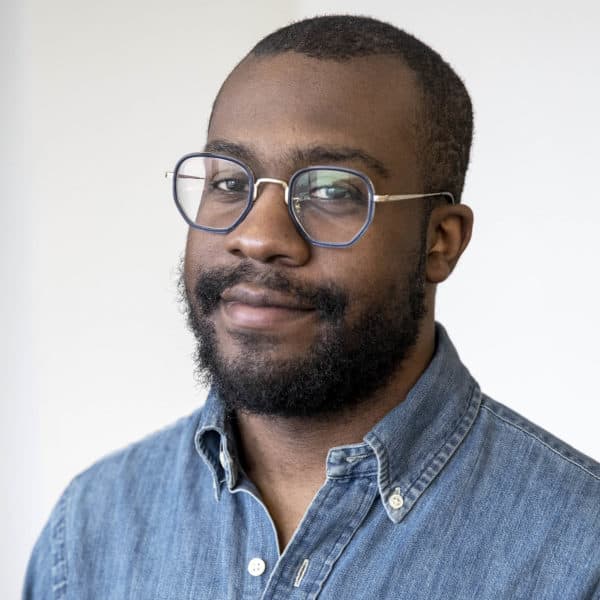Advertisement
Boston's Newest Police Commissioner Willie Gross Is Black, Blue And 'All Cop'

On Monday, the Boston Police Department will swear in its first black commissioner: Willie Gross.
Former colleagues said the 33-year police veteran can be tough and compassionate — qualities that make him ideal for the position. But is he more of the same?
'The Village Concept'
Back in 2014, after being promoted to BPD's superintendent-in-chief, Gross went on "Common Ground," an hour-long program on Boston Neighborhood Network put on by the Suffolk County Sheriff's Department.
On the program, Gross said when he was growing up in rural Maryland, he knew he wanted to be a police officer.
"I always had a desire," Gross said. "I hated bullies. Always loved law enforcement."
Gross grew up in Hillsboro, Maryland, raised by his mom, who worked three jobs, with help from his grandmother.
That upbringing informs his policing — what he calls "the village concept." Gross defines it as officers learning to build with the neighborhoods they serve. He said what makes him good at this is his authenticity and the fact that he's not judgmental.
"Keep it real. You want to send the message that you want to help out. It has to be genuine. People have to know that you never forget where you came from," Gross said.
Former BPD Commissioner Kathleen O'Toole said Gross is a good crime fighter, but his greatest asset is his ability to be diplomatic.
"Nothing is more important in policing today than community trust and support," O'Toole said. "Without that we'll all fail."
Advertisement
O'Toole was Boston's first female police commissioner. She said it's great that Gross is the city's first black commissioner, but it's probably not his focus.
"Willie and I would share something in common in that all we've looked for throughout our careers is a level playing field," she said. "When you're the first, you know, some people on the outside tend to make a bigger deal of that than people on the inside. You just want to have the respect and confidence of your peers."
A lot of people have hope that Gross being the first black commissioner means that the relationship will improve between BPD and communities of color. But not everyone.
"When you're the first, you know some people on the outside tend to make a bigger deal of that than people on the inside. You just want to have the respect and confidence of your peers."
Kathleen O'Toole
Brock Satter with Mass Action Against Police Brutality views Gross as "part of the old regime," a regime which doesn't have a good relationship with communities of color.
"Really the thing that we need to look at is, are the police who are committing crimes, who are harassing folks, who are trampling on people's rights — are they being prosecuted? Are they being held accountable? Are they going to jail? And so far the answer is no," Satter said. "I don't think it would be any different."
But BPD's former Superintendent-in-Chief Dan Linskey says Gross genuinely cares for the community and law enforcement equally. Under Gross, he sees the relationship between police and the neighborhoods they serve improving.
Linskey remembers a moment after the Boston Marathon bombing when he realized he had the utmost trust and confidence in Gross.
"We had a report that an armed robbery suspect who might've possibly been involved in the shooting of Officer [Sean] Collier at MIT had been dropped off at a hotel in Dorchester," Linskey recalled. "And I just looked at Willie and said, 'Willie, I need someone to get over there and see what we got.' He said 'I got it,' and went over there and took control of it."
The suspect wasn't their guy, but Linskey says Gross coordinated the cavalry like he needed to. Another time that stood out for him was when Gross helped develop a training for officers getting attacked while in their cars.
Another element that makes Gross suited for the role of top cop is his ability to mentor, O'Toole added.
"Mentoring is an extraordinary responsibility and important responsibility for leaders and an organization and for senior officers," she said. "I think he's very well positioned to take the reins at this point."
BPD did not make Gross available for an interview, but on "Common Ground" — that Suffolk County sheriff's show — he said BPD is more inviting than in years past. And he says throughout his tenure with BPD, he's had great, diverse mentors.
"Both officers of color and Caucasian and I soon found that your color is blue," Gross said on the show.
In a Boston Globe article from the late 1990s, Officer Walter Fahey is profiled, one of Gross' mentors. In the article, Fahey talks about how he was a supporter of getting more women and more people of color on the force, and speaks of Gross, saying he is all cop.
"Give me a Willie Gross, and I'll run through walls with them," Fahey said in the article.
This segment aired on August 6, 2018.
